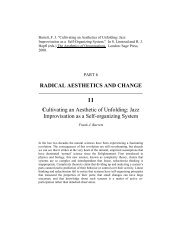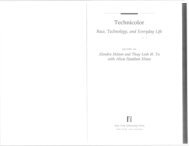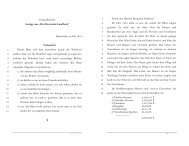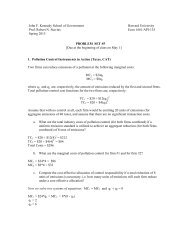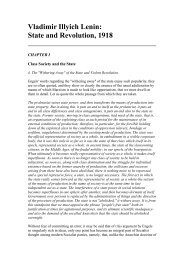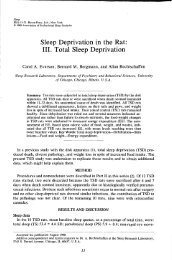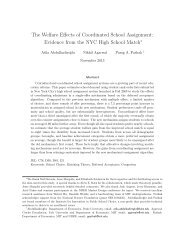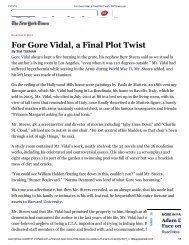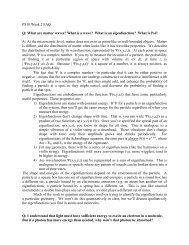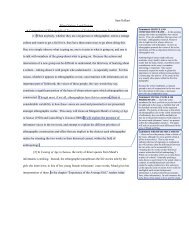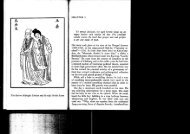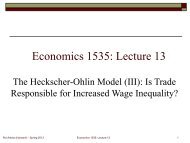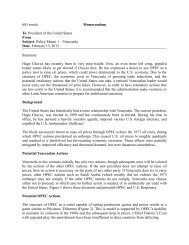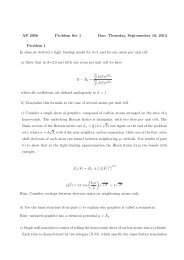CUisis AuthoU(s): ReinhaUt Koselleck and Michaela W ... - iSites
CUisis AuthoU(s): ReinhaUt Koselleck and Michaela W ... - iSites
CUisis AuthoU(s): ReinhaUt Koselleck and Michaela W ... - iSites
You also want an ePaper? Increase the reach of your titles
YUMPU automatically turns print PDFs into web optimized ePapers that Google loves.
<strong>Koselleck</strong> + Crisis<br />
direction of history, this critique is propelling the crisis. In Bruno Bauer's<br />
words: "History . . . will elevate to power the freedom which theory has<br />
given us <strong>and</strong> thereby create the world in a new form .... History will take<br />
care of the crisis <strong>and</strong> its outcome."'03 Judging history correctly will deter-<br />
mine whether the problems of state, church, <strong>and</strong> society dem<strong>and</strong>ing a deci-<br />
sion can be solved in practice. The concept of crisis thus remains within a<br />
philosophy of history calling for the execution of tendencies revealed<br />
through critique.<br />
In the words of Mevissen, an entrepreneur close to the Young Hegeli-<br />
ans <strong>and</strong> protector of Marx, "The recognition of the presence of an organic<br />
affliction, the sources of which are not yet or insufficiently understood,<br />
presages a historical crisis. Today, as in similar epochs in the past, the sole<br />
reason for the crisis is the incongruence between the culture [Bildung] of<br />
the century <strong>and</strong> its actual customs, forms of existence <strong>and</strong> conditions. The<br />
sole alternatives are whether the crisis will be resolved through revolution-<br />
ary upheavals or whether the human spirit has become strong enough to<br />
transform voluntarily <strong>and</strong> from within those conditions revealed by the<br />
power of knowledge." In line with his theory, Mevissen actually sought to<br />
abrogate the privileges of property <strong>and</strong>, through the creation of a "General<br />
Assistance <strong>and</strong> Educational Association" to integrate-unsuccessfully-the<br />
"excluded majority" of workers into society, thereby linking freedom <strong>and</strong><br />
equality.104<br />
That same diagnosis was offered by Lorenz von Stein when, in 1850,<br />
he was the last to attempt a system-immanent interpretation of history derived<br />
from the premises of German Idealism. "Seen from the perspective of<br />
society's development," European history reveals "two great epochs": The<br />
first, antiquity, was marked "by the coexistence of free property <strong>and</strong> unfree<br />
labor"; the second, the period of the Germanic kingdoms, "witnessed an<br />
ever-changing battle between free labor <strong>and</strong> free property. Our present<br />
epoch is nothing but the last stage of that battle. Throughout Europe there<br />
is a sense that the present condition cannot last much longer. Powerful <strong>and</strong><br />
terrible movements are coming to the fore; no one dares to predict where<br />
they will lead. Hence no one has the right to offer a magic formula for the<br />
future." For this reason, von Stein withdraws to a third position <strong>and</strong> ad-<br />
103 Bruno Bauer, Die gute Sache der Freiheit und meine eigene Angelegenheit (1842), cited<br />
in Stuke, Philosophie der Tat, 174.<br />
104 Gustav von Mevissen, "Ober den allgemeinen Hilfs-und Bildungsverein" (1845),<br />
printed in J. Hansen, Gustav v. Mevissen vol. 2: Abh<strong>and</strong>lungen, Denkschriften, Reden<br />
und Briefe (Berlin, 1906), 129ff.<br />
385



